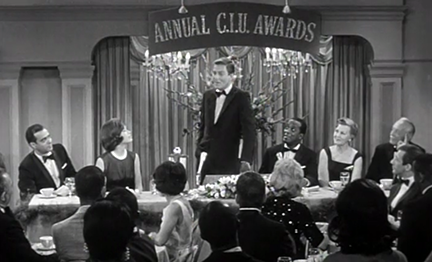A 1965 episode of The Dick Van Dyke Show shows Rob Petrie (Dick Van Dyke) and his wife Laura (Mary Tyler Moore) accepting an award on behalf of Rob’s boss, Alan Brady (Carl Reiner). The award, given by the fictitious Committee for Interracial Understanding, is for Alan Brady’s contributions to understanding and honesty between the black and white communities.

One sentence in Rob’s acceptance speech gets to me. “It seems to me understanding should be as natural as breathing,” he says. “And you don’t get awards for breathing.”
Understanding in the racial divide is hard work. I’ll be the first to say, I don’t get it, I don’t get what it’s like to be black in America. I’m white, I grew up in an almost exclusively white neighborhood and school district, although as an adult, I entered into much more diverse scenarios.
I have two things going for me in my desire to bridge the gap (well, hopefully more than that, but we’ll start with these two): I was raised in the 60s by parents who believed God made everyone equal, but fully recognized life didn’t treat them that way, and as an adult, I frequently worked with and/or lived in diverse neighborhoods that helped me be at ease with people of numerous ethnic backgrounds.

There was a small amount of interracial contact throughout my teenage years. In high school, out of approximately 2,400 students, only one, Tony, was black. Tony moved to my town in his junior year to live with his mom, and a year later, moved back to stay with his dad, where he could go to a school that was significantly more diverse. I was the same age as Tony, and he ended up going to my church, so I got to know him fairly well, in particular because he became close to one of my best friends.
When Tony moved, he didn’t tell too many people he was leaving, so we didn’t get to say good-bye. He did talk to my best friend, Carolee, and she told me he didn’t want a lot of fuss. You see, Tony was incredibly popular, wonderfully talented and in demand socially. He knew we wouldn’t understand why he would want to move to a small town in the middle of nowhere with a K-12 school that had fewer than 400 students. After all, our school ruled.
I didn’t understand. We liked him, and we treated him in the manner you treat someone you like. What I couldn’t see, couldn’t feel and didn’t live was the disconnect between the races, the incredible alone feeling Tony no doubt felt every day walking down the halls of our high school. I knew a lot of the girls stared at him because he was good-looking, but there was no way for him to differentiate between those looks and the stares that came because he was black. For that matter, a lot of girls probably stared because he was good-looking and black. That, I’m willing to wager, is a different look. The element of the forbidden, the socially questionable to a teenager is, well, what makes a simple crush a great romance.
At the church Tony and I attended, there were a handful of black families. Three of those families were related; the husbands/fathers were brothers, all very close in age. They also looked like they could have been identical triplets. Ever the blunt one, I asked my friend Alethea (also black) if it was a problem I couldn’t tell them apart. Did all black men look alike to me?
No, Alethea assured me, she’d known the family for years and the easiest way for her to tell these three men apart was through their wives. The wives were easy to distinguish. So I, too, got to know the families through the wives, as well as their children, who were all under the age of five.

At the same time I was working as a candy-striper at the local hospital. In case you don’t know, “candy-striper” is the nickname for volunteers who wear a red-and-white striped pinafore, white blouse, and in my case, white ankle socks and white tennis shoes. I worked Sunday afternoons, and the nature of that shift meant we spent a lot of time in the maternity ward.
One of the families I spoke of above had just had a baby. I was walking through the infant viewing area, and the man I thought was the new father was standing there, admiring the newborn, a thoughtful, musing look on his face.
“Congratulations!” I said. “I heard in church this morning you had a daughter.”
“Oh, it’s my niece,” he said. “It’s my brother’s baby girl.”
“I’m so sorry,” I apologized. “I’m always getting you and your brothers mixed up.”
“Everyone does,” he said, smiling.
“Belinda!” my fellow candy-striper, Karen, hissed at me as we walked down the hall. “I can’t believe you didn’t know he wasn’t the father!! He goes to your church!”
“Oh, it’s okay,” I replied. “They’re brothers. They all look alike.”
From down the hall I heard a deep, full-throated burst of laughter. I have no doubt that story was told time and time again in their family. I hope I came across as the girl I think I was: nice, kind, perhaps a little naïve and (please, please) not racist. Well, the story would be better that way, so maybe I did.
Was I ignorant? In many ways, yes. I simply didn’t understand.
No matter how funny that man and his family may have found the story, and I hope they did laugh, the underlying issue isn’t funny. Was I ignorant about racial issues? In many practical ways, yes. I simply didn’t understand. If you were black or any other minority and I was your friend, if I treated you as well (or poorly) as any of my other friends, what was the problem between us? If you were a complete stranger I passed in the store, a customer in my teller line at the bank, a sales associate at the cosmetics counter where I bought eye shadow, why would there be a racial problem if I spoke to you with respect and dignity? And yet, there was. I just didn’t always know it.
An offhand remark might be misinterpreted. That isn’t exclusively a racial issue, that’s human communication. Some of it is regional; terms that mean one thing in California have an entirely different connotation in Minnesota or Arkansas. I learned not to use the phrase, “jerk someone around.” In some parts of the country, it means to treat another person poorly, in other parts, it’s a very sexual expression. I had a hard time keeping it straight.
Some of it is coming into the middle of a conversation and hearing a phrase out of context. I’ll never forget when, in my late teens, one of my friends and I were talking about a third friend’s abusive relationship. Gina, the one I was talking to, was a literature major, and would use literary terms in everyday conversation (which drove us crazy), including the word “dark” to describe anything bad or evil.
We were waiting to be seated in a crowded restaurant, and there were two hostesses, one white, one black. Our name was called, and as we approached the hostesses, Gina, referring to our friend’s situation, was saying, “she needs to throw that dark dog in the river.”
Both young women tensed up. Gina, feeling passionate about our friend’s plight, was only making things worse. I don’t recall the rest of what she said clearly enough to recreate it, but it did sound bad out of context. I was uncomfortable and didn’t know what to say without further digging a hole.
Our waitress had no problem with it. Young and brassy, she, perhaps inappropriately, confronted Gina about the term “dark dog” as well as the rest of her rant.

“Did you mean a dog, or a black man?” she asked. “Because this is a nice restaurant, and we don’t tolerate bigots or puppy killers. Those girls,” she pointed to the hostesses, who were out of hearing distance, “are my friends, and they were offended. I just want to know why.”
Now I was incensed. “We were talking about a friend’s boyfriend,” I said sharply (and loudly). “Her white boyfriend.” That didn’t sound so good to surrounding diners, either.
Gina was perplexed. “Come on,” I said, “let’s go.” We left, both upset and confused. We weren’t racist, surely not?
I stopped telling that story after several people told me Gina’s statements actually were racist and we didn’t realize it. I’ve struggled with that one. So much of our language is indeed subtly racist, under the radar and pervasive. It is perhaps the most difficult to challenge and change. Gina, a typical college student, was under the spell of all she was learning. I’m willing to bet she was showing off more than putting down by using the word “dark.”

Is the term “dark comedy” racist? I do not know. I use it to describe movies such as “Arsenic and Old Lace,” in which two elderly ladies kill off their gentleman callers and bury them in the cellar, hence the darkness in the comedy, and I’m far from the only one to do so. I don’t even know what the racial connotation would be in the term (I get the correlation between “dark” and “black,” but it’s the further definition I’m unclear on). Maybe that’s the problem. I don’t know.
We are all equal in God’s eyes, but we do not live in a society that treats us that way, and our view of ourselves and our world is shaped in part by how we’re treated. Several years ago I attended an annual statewide convention for people who, like myself, worked with others with developmental disabilities. The keynote speaker was a woman who was black and in a wheelchair. I don’t know what her disability was, but I surmised it had been lifelong.
“When people ask me how I identify myself, as disabled, black or female,” she said as she summed up her talk, “I tell them I identify myself first as African-American, than as a woman, than, as a black woman with a disability.”
That was an eye-opener. I gained a much greater understanding about why the phrase, “I don’t even see [name of black friend] as black anymore. He’s just [name]” is so degrading. I had long ago realized how bogus it was to say that. If you can see, you see another’s race. What I hadn’t realized was if you’re black, it’s part of your identity. An essential part. If you’re white, it rarely is a significant part of the equation of identity.
When a white person says they don’t see race, they mean, “I’m not adding something to our relationship that would separate you from me.” As I understand it, if you’re black, you’re hearing, “I’m acceptable if I deny an essential part of who I am.” There’s a huge discrepancy in meaning there, and a cartful of issues to sort through.
I’m always timid about adding my comments. Will some barely disguised ignorance show through?
I have several blogging friends who are black, and I follow their blogs and interact with them because I like them. Some of them address race more frequently than others, and I’m always timid about adding my comments to their posts. Will some hidden arrogance, some barely disguised ignorance show through? I’ve had some people reply sharply to my comments, but fortunately, I’ve been smart enough to respond and try to work through any misunderstandings or subtle feelings of whatever I may be expressing.
I’m acutely aware of the danger of sounding condescending. Plus, when you’re leaving a comment on a blog, the context of Who I Am isn’t there. If you haven’t interacted with me, all you have is my little profile picture, little white me in my pink blouse, to give you any insight into who I am.

I can never fully understand the black experience. I want to be open, empathetic and supportive of all races and other minorities. Even as I write that, I’m reminded I was chastised once for using the term “races” synonymously with “minorities.” I felt like I couldn’t win, although I did have a decent discussion with that blogger.
I’m reminded of Rodney King, victim of terrible racial abuse, who, after his ordeal had been addressed by the courts and the public, said, “Can’t we all get along?” Some people mocked him for saying it, some called it simplistic and even foolish. I don’t want to brush over the evil or painful, but I do want us all to get along.
I know it isn’t that easy.
I’m asking my black friends to bear with me. I sincerely want to do better. I’m asking my white friends to seek understanding. For that matter, we should all seek understanding. The learning and growth are a strengthening process for all of us.
This is a turbulent time for our country, but it’s also a time of opportunity. I hope someday understanding is, indeed, as natural as breathing.
As the man said, you don’t get awards for breathing.
Image Credit, featured image: International Children © BigStock; Television, Movie Images © their respective studios and used under the Fair Use Clause of copyright law.


I love the way you write about your insight, Belinda. It comes from your past experience, your openness and your willingness to admit anything you perceive as imperfect – you’re so humble!
Of course, I found the recent movie “Hidden Figures” to be very enlightening. Knowing it was based upon a true story had me scratching my head and wondering how it took so long for me to learn about it.
LikeLiked by 1 person
I very much want to see that movie. One of my friends saw it, and said the audience cheered and applauded at the end of it. You don’t see that too often anymore.
LikeLiked by 1 person
Oh, you will really appreciate it. A good friend of mine is a screenwriter and did criticize that the story was slightly “dumbed” down with some silly moments. But I didn’t see that. It is an absolutely amazing story. Let me know what you think after you see it!
LikeLiked by 1 person
There’s always going to be some criticism, especially from people who know the business. They see it differently. The question becomes, did it work for the audience? That’s what drives pictures, of course. Hopefully you don’t have to “dumb down” things too much, and dumb down is subjective, I suppose.
LikeLiked by 1 person
I absolutely love this, but I have a huge bias for self-reflection and inspiration 😉 I do wish more white people (and more people, generally speaking) would think about their place in the world and how they interact with it.
LikeLiked by 1 person
Thank you so much! Racism is such a volatile issue that frankly, I have often avoided it. Yet I feel strongly a lot of what keeps us from understanding the issue is a lack of communication and perspective. Growing in my understanding of how others feel and what they believe, as well as realizing my perspective, however sincere I may be in wanting fairness and equality, may be limiting me. It is a little scary to put my thoughts out there — I don’t like conflict!!! but if it helps at all, I want to do it.
LikeLiked by 1 person
Reblogged this on Sarah's Attic Of Treasures and commented:
Here’s to the good old days of Dick Van Dike and Mary Tyler Moore.
LikeLiked by 1 person
Thank you for the reblog! This is a post that means a lot to me 🙂
LikeLike